Posts Tagged ‘Women’
She Dreams Courageously: One Woman Who is Making it Happen
“I believe that while you might not be able to change the whole world, you can change your world.”
— Leisha Pickering
Leisha Pickering dreams courageously. While going about her life as usual on her farm in Mississippi, a man stopped by asking for work one day. This inspired an idea. She said yes to that idea, started pursuing it in her kitchen and today she is changing the lives of people in her community, the U.S. and around the world.
As Founder and CEO of Musee and Pretty Inside, Leisha utilizes her brands to create opportunities for those who may not otherwise be given one, to support those in need and to empower women. World Relief is proud to be a partner in this work.
World Relief President, Scott Arbeiter, sat down with Leisha to learn about her story and her desire to use her company to impact the women who purchase their products while also affecting change for refugee women and children around the world.
Download the transcript of the interview here →
Leisha dreams courageously and inspires others to lean into the change that we can create in the world. Creating change doesn’t require much, only that you begin — with your idea, what you have and where you are. Will you join us in building a better world by giving today?
Visit Pretty Inside to make a purchase and help support women rebuilding their lives.
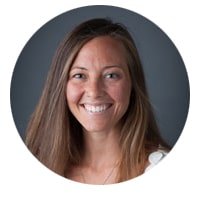
Dana North serves as the Marketing Manager at World Relief. With a background in graphic design and advertising and experiences in community development and transformation, Dana seeks to use the power of words and action to help create a better world. Dana is especially passionate about seeking justice for women and girls around the world.
Systems Change in Seattle
As World Relief Seattle’s Executive Director and an immigrant myself, I have seen the razor-thin line between security and insecurity that many immigrants experience. Never was this more clear to me than this year, as our office rallied to serve those hardest hit by the COVID-19 pandemic.
As the pandemic wore on last year, we received many calls for help from our community — for help with navigating unemployment, for help finding work, for help with rent assistance and for help with the food insecurity many were facing.
World Relief Seattle’s Resiliency Programs Manager, Tahmina Martelly, jumped into action, along with Santa Pradhan, our Employment Manager. Both of them being women of color and women who have faced the refugee journey, they were hearing the need both at work and at home in their communities.
Without delay, the Employment Team united to help over 98 folks access unemployment benefits and many others get re-employed. The Resiliency team addressed the food insecurity issue in partnership with Hillside Church, where our Community Garden is located. Tahmina began to put the word out and people from all across the community began to show up with food. We formed a formal partnership with Northwest Harvest and began a weekly food distribution site— serving more than 800 families a week with food boxes that lasted 3-5 days.
One day, I went to check out the operations, first-hand. And it struck me that most of the folks in the cars were from our black, brown and immigrant communities. After 30 years of working in marginalized communities, I realized that they were the very same people that were in these lines whenever crisis hits. It disturbed me so much that I returned to my car crying and wondering how we could change the system, so that the next time a crisis hits, our communities could go to the store and buy their own food, not wait in lines at distribution sites.
As a Leadership Team, we decided that to change the system we needed to invest in two powerful and proven strategies to move people out of poverty— economic and educational empowerment. So this year, we’re planning to launch several “system change initiatives”. They will include a commercial/teaching kitchen, an Immigrant Entrepreneurship Academy for emerging businesses and support services for existing immigrant businesses. We are also going to continue investing in immigrant and refugee youth — making sure the curriculum in our Summer Academy is academically rigorous, provides academic support and prepares them for a bright future.
We might not be able to change the whole world, but this International Women’s Day and for Women’s History Month, the amazing women on our team, and I, hope to make a positive change in our small piece of the world!
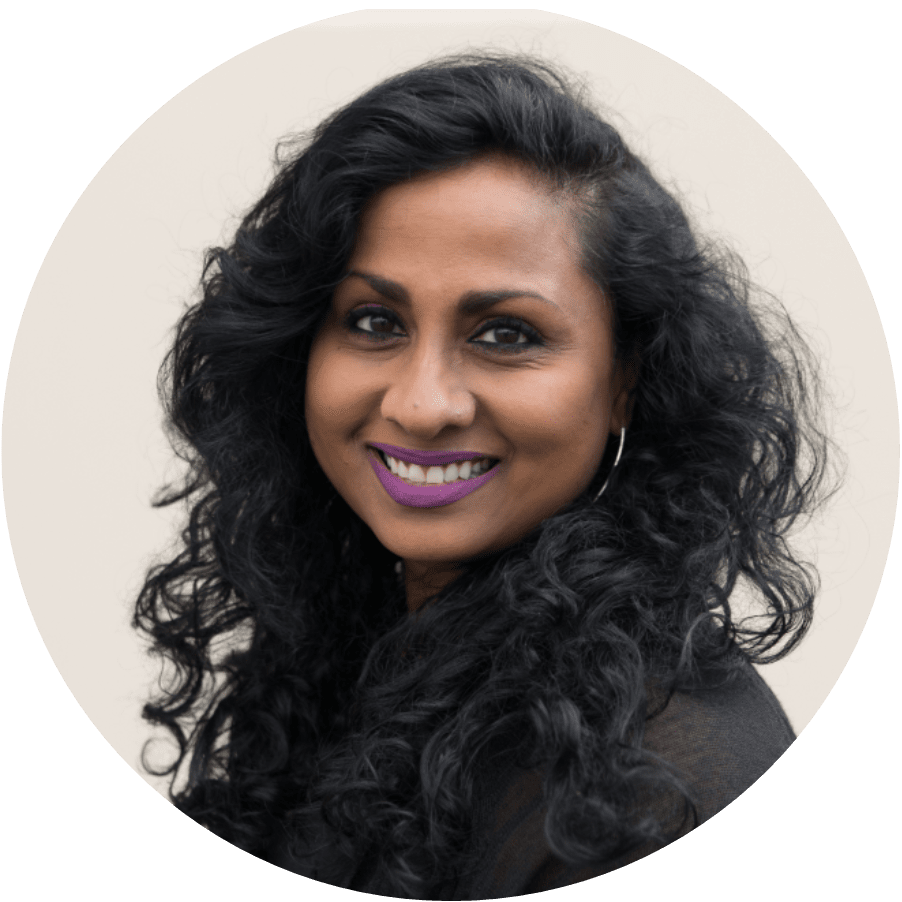
Chitra Hanstad began as Executive Director at World Relief Seattle in January 2017. Prior to this, she spent time in India consulting for Justice Ventures International (an anti-trafficking organization) on strategic planning and fund development and as a Philanthropic Advisor for the Seattle Foundation. While her career started in corporate advertising, public relations and media relations, she has spent most of the last twenty years working for local and international non-profits. Chitra has a passion for seeing at-risk communities thrive. She has served on many boards including Covenant World Relief & Urban Impact, and volunteers with The Stability Network.
Breaking Barriers in Burundi: Women Who Make It Happen
Leocadie is a leader in so many ways. She’s a farmer, a wife, a mother to eight children and a grandmother of 20 — two of whom, she proudly says, are a set of twins who were born this past February.
For most of her life, though, Leocadie says women weren’t welcomed into leadership roles within the community nor were they empowered to be a part of making decisions for their families. But that began to change in 2010 when World Relief launched a savings program in her community and invited women, like her, to lead.
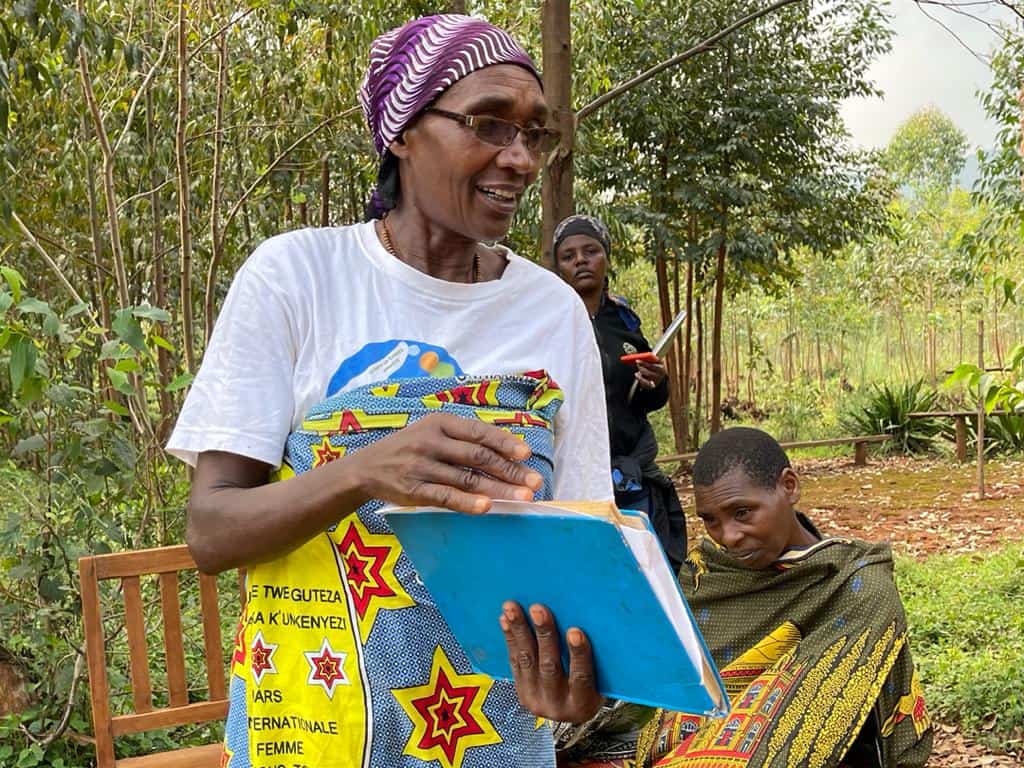
“When our group was formed I was elected to lead them. I took it as a privilege,” she said. “I was inspired by the interventions that [World Relief] was conducting because I saw them as a way to help others in my community who were going through many issues within their families.”
Over the next 11 years, Leocadie continued to grow as a leader. When World Relief launched agricultural programming in her community, she stepped up to lead in this area as well. And while the economic advancements she and her group have made by implementing new agricultural techniques and better financial management, the transformation her community has experienced in the area of gender equality is equally as remarkable.
“In the past, women were supposed to stay home and take care of the family, with their time mostly spent in the kitchen,” she said. “Now we participate in all decisions, at the colline (community) level. We have female leaders, savings group female leaders. I am very happy to see how I am respected by women and men. They listen to me because they see the impact of what I am doing.”
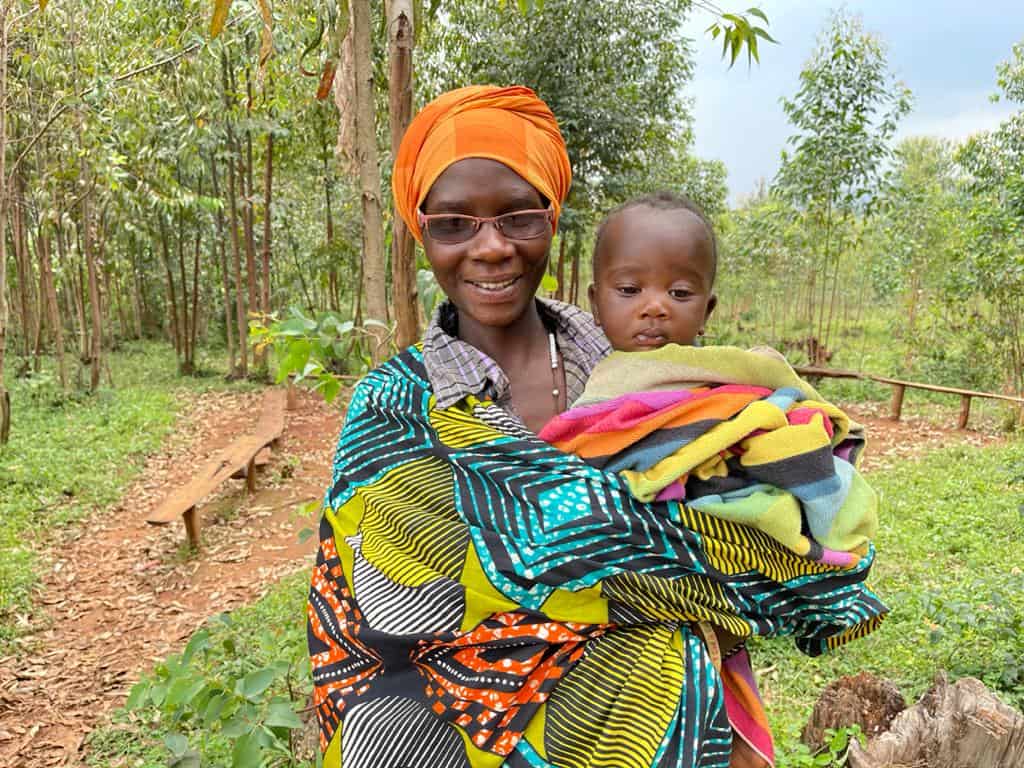
Leocadie’s leadership is rippling throughout her community. She’s created a sense of connectedness and support for women in her group like Jeane, the youngest member of the group, who says that learning from Leocadie has helped her grow as a mother and has improved her marriage.
“I am very happy to be part of this group,” Jeane said. “I am one of the youngest with two little children. I get an opportunity to be with wise women, grannies. Group members opened the door for me to learn from their marriages. As a result, I know how to be a better woman, and my husband and I discuss our feelings and make decisions together. ”
And it’s not just the women who are experiencing transformation. Pasteur Sinzumusi, the lone man in the group of 24 women, has increased his income, improved his marriage and totally shifted the way he views women thanks to Leocadie’s leadership.
Pasteur initially joined the group because he noticed the women were experiencing a better crop yield than he was.
“Before joining them, I had no savings at all,” he said. “I was farming in old fashion (outdated techniques), which did not have a good harvest. The reason I joined is because I saw their lives were different from mine. They had new skills and knowledge in farming, so I approached them.”
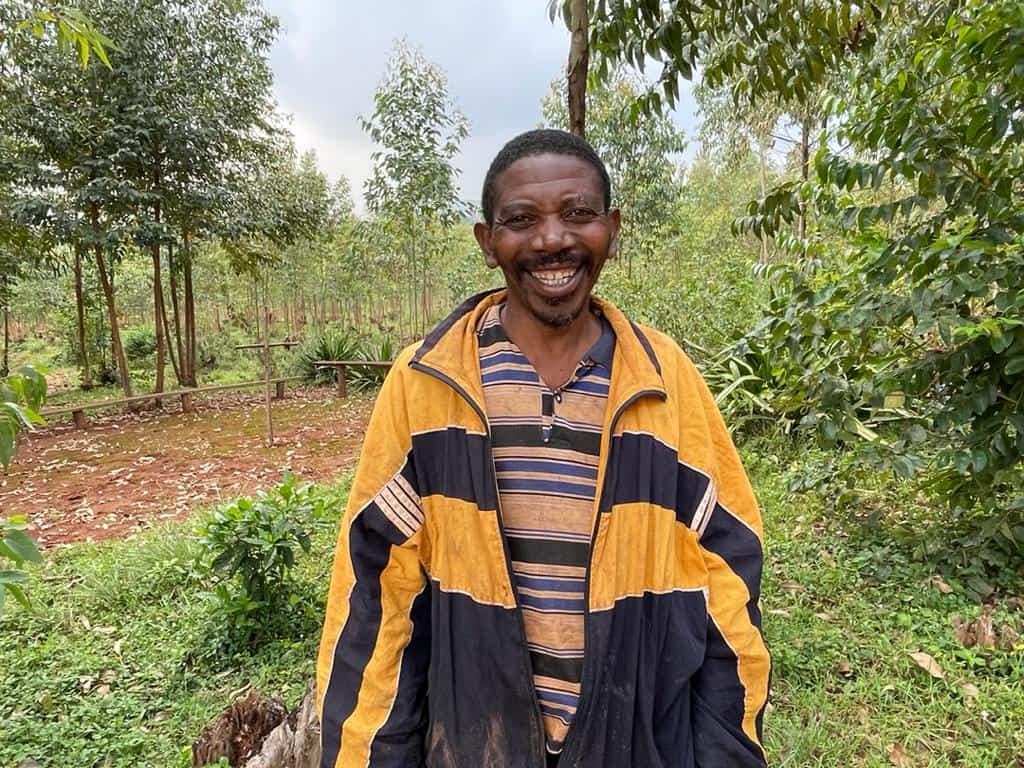
Today, Pasteur says his plot of land looks amazing, his income has increased and he can now easily afford to buy necessities like soap and send his kids to school. He attributes much of his success to the leadership of Leocadie and the community of women he has learned alongside.
“I respect my leader. She is just amazing. She does her duties well. Through her leadership, my way of viewing women has changed. Before I thought they couldn’t lead, but now I can testify that women are capable of leading. And this made me respect my wife and let her step into exercising her gifts.”
Leocadie is grateful for all the ways she’s seen her community transform. Women are more involved in community associations; marriages are more egalitarian in their decision-making; women participate in household management and can contribute financially.
She is hopeful to see her group continue to improve their farming and embrace new skills.
As we celebrate the accomplishments of women and the barriers they are breaking down, we echo the words of Pasteur when he said: “Women can do things as men. I invite all men to come to see how our association is well organized and well managed by female leadership. They will learn that women are good and great leaders.”
Millions of women, just like Leocadie, are choosing to challenge the limits placed on them and break through the barriers around them. Their daughters, granddaughters and great-granddaughters will know a world where women are respected, valued and lead. Will you join them in building a better world by giving today?
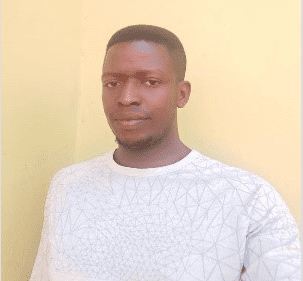
Ezechiel Hatungimana born and raised in Burundi with a passion of seeing his country developed holistically. Prior to World Relief, Ezechiel has served in a local organization aiming to empower the lives of people holistically, working directly with churches. While he is still completing his bachelor’s degree in Business Administration, He joined WR 2018 and he supervises a team of 20 people who equip 500 local churches. Ezechiel is married and blessed with two children. Ezechiel and his Family worship at PTI Church where he serves as a preacher.

Rachel Clair serves as a Content Writer at World Relief. With a background in creative writing and children’s ministry, she is passionate about helping people of all ages think creatively and love God with their hearts, souls and minds.
Crisis in Sudan: Responding to Violence and Empowering Women
Civil Unrest in Geneina
On January 16, 2021, civil unrest was reported in the Geneina area in West Darfur as a result of violence between Masalit and Arab tribesmen — groups that have had a long history of conflict over land and water resources. Tensions have continued to grow in the days since this recent bout of violence, resulting in:
- About 183,000 displaced people in the Darfur region, with an additional 3,500 who crossed the border into Chad*
- At least 470 deaths and 300 injuries
- An estimated 149,000 displaced people in West Darfur alone*
In crises such as these, women and girls are especially vulnerable. While women and girls in Sudan already face challenges due to their gender, these challenges become more pronounced when they are living in displacement camps as a result of violence in their communities.
The United Nations High Commissioner for Refugees (UNHCR) states that “sexual and gender-based violence (SGBV), including domestic violence and alcohol abuse, increases in such circumstances. Women and girls may be attacked as they look for firewood or water outside the camp”, and “As financial resources are depleted, adolescent girls are married off at increasingly younger ages”.
A Trusted Partner
Over the last several years, World Relief Sudan has become a trusted agency among the Sudanese people, other NGOs and the Sudanese government. This trust enabled our team to quickly respond to the latest humanitarian crisis in partnership with UN agencies and other INGOs.
World Relief Sudan was recently awarded $900,000 in emergency funds from the Sudan Humanitarian Fund (through the UNDP) to provide immediate humanitarian assistance.
Our emergency response thus far has included provision of potable water and emergency latrines, hygiene promotion training, mobile health services for pregnant women and children under five and distribution of basic non-food items for 39,000 internally displaced persons.
Unique Challenges for Women
World Relief Sudan is well aware of the specific challenges which women and girls face in such environments and is taking measures to prevent violence, protect vulnerable beneficiaries and support the agency and voices of women in their communities.
Among the many projects to provide for the immediate needs of displaced people, the emergency response team is working to ensure that all people in displacement camps have a clean water source less than 1km from their temporary dwelling.
These water points are fenced, to reduce the possibility of violence around these areas, as violence towards women is common when women travel outside of their villages to collect water. By reducing the distance to water points and fencing them in, women are at far lower risk of being attacked.
In addition, WASH (water, sanitation and hygiene) committees are being formed — and are composed of at least 40% women — to monitor the use and maintenance of said water points.
WASH committees are important because they ensure regular maintenance and orderly use of the access points. When women are on these committees, they can better emphasize the protection of women and children at water access points.
What’s more, because these committees are made up of local residents, they will continue in their work long after World Relief has left the area.
Challenging for Change
As the conflict in West Darfur continues, women, girls, men and boys are all receiving effective emergency services from World Relief Sudan to mitigate their present challenges.
These services are provided with special emphasis on gender protection and representation, challenging communities to change the way they engage with one another, and empowering women to take leadership roles in their communities.
*Update: As of May 12, 2021, the number of people displaced by the current conflict has increased:
- 151,400 IDPs in Geneina (West Darfur) from Jan-April 2021
- 65,000 newly displaced IDPs in April alone
- Total of 237,000 people displaced by conflict in the Darfur region in the first 4 months of 2021 – which is more than 4 times those displaced by conflict in all of 2020.

Lydia Dawson serves as World Relief’s Humanitarian and Disaster Response Unit Program Officer in Sudan, and in disaster response worldwide. Prior to joining World Relief, Lydia worked in homeless services and community development in Oregon and California. She is passionate about equity and honor for underrepresented groups, both locally and internationally.
Seeing the Gift in Women
This time last year, right before COVID-19 exploded across the globe, World Relief’s International Programs leadership team came together for a weeklong global gathering in Musanze, Rwanda. As sisters and brothers from 11 different countries came together — Haiti, Cambodia and Kenya to name a few— we broke bread, prayed and celebrated all that God has done through World Relief in our 75 years of service.
While the entire week was filled with rich fellowship and deep strategic conversation, there was one particular day that impacted the three of us greatly. On that day, we focused our learning and discussions around the theme of gender equality. World Relief leadership presented our top strategic goals, one being greater gender equality both within our offices and across our programs.
To our great encouragement, everyone in attendance pledged to reaching this goal by 2022 through the following commitments:
- Commitment of Leadership: Leadership in each country office understands and prioritizes gender equality not only through their own actions, but addresses gaps recognized organizationally and programmatically.
- Gender Balanced Leadership: Increased gender balance in leadership roles at all levels of World Relief staffing. This is manifested by an increased proportion of women in all staff roles with special focus on most senior roles. Women are intentionally developed and included in succession planning and policies reflect concern for equality in career development opportunities and in equal compensation and benefits practices.
- A Gender-Sensitive Organizational Culture: World Relief is recognized internally and externally for its gender-sensitive organizational culture.
- A Gender Programming Focus: A gender lens is incorporated throughout the entire programming cycle within World Relief programming. This is manifested by staff being knowledgeable in the basic elements of gender analysis and possessing relevant technical skills to integrate gender in programming.
- An Accountability Framework: An accountability framework is in place organizationally to track progress on gains made in all of the above areas and to inform future action regarding gaps.
As the day folded into evening, the women of Word Relief led us in worship. There were songs, poetry and a devotional from our, then, new Burundi Country Director, Cesalie Nicimpaye, a long-awaited woman among many men. Women danced and sang in every language. This small moment felt to us like a commissioning as the men prayed over us at the end of the evening saying, “Help us see the gift you have given us in the women of World Relief.”
Since then, despite the hurdles that 2020 presented, we have each spent much of our time advocating for gender equality and working tirelessly to see a biblical vision of equal leadership among men and women become the norm across World Relief and beyond.
Today, as we prepare to celebrate International Women’s Day, we celebrate just a few of the outcomes and small beginnings that this commitment has spurred on:
- Every World Relief international office now has a dedicated gender focal point
- Effective June 2020, World Relief rolled out a long-awaited paid maternity and parental leave policy.
- Every World Relief international office has concluded a gender scorecard based upon the work of the Wheaton Network Initiative on Gender, Development and Christianity .
- All World Relief offices are in the process of creating a gender plan, which includes improvements in gender sensitive programming and data collection, recruitment processes and leadership pipelines that target women and better facilities for our female staff.
- All international offices are currently participating in a six-week intensive Development Associates International course, Women and Men Leading Together.
As 2021 brings with it new opportunities for growth in this work, we will continue to challenge for change, creating a better world for women and girls for generations to come. Will you join us?
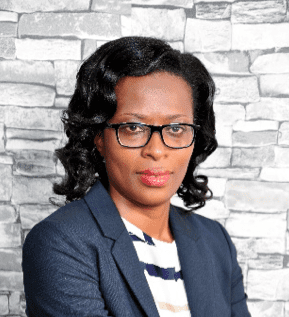
Clemence Nkulikiyinka has served with World Relief since 2008. Currently she serves as a Technical Advisor for Integral Mission, and one of global gender focal point. She has served in different roles, especially in Rwanda.
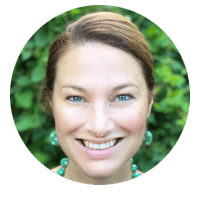
As the Director of the Program Resource Team, Joanna Kretzer Chun leads a team of global technical advisors that support World Relief international programs spanning Health and Nutrition, Savings, Agriculture, Child Development and Protection, and Couples’ Strengthening. With over fifteen years of international development experience, Joanna’s programming background spans the areas of gender mainstreaming, women’s empowerment, child protection, child development, faith leader engagement, and social norm change. Joanna holds Master degrees in Intercultural Studies and Family Studies from Fuller Seminary and a BA in Foreign Affairs from the University of Virginia. She resides with her family in Washington, DC.
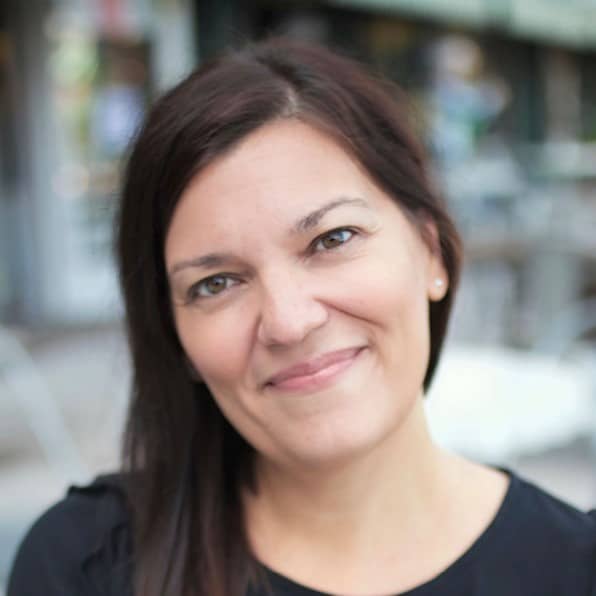
Eeva Sallinen Simard is Chief of Party for World Relief’s USAID funded SCOPE (Strengthening Community Outcomes through Positive Engagement) Project in RMNCH, HIV and COVID-19 response serving in Malawi, Kenya, Haiti, South Sudan, Rwanda, and DRC. She holds a master’s degree in International Politics from the University of Helsinki, and an MBA from Johns Hopkins University Carey Business School. She lives in Baltimore, MD with her husband, son, and daughter.
Clemence, Eeva and Joanna are gender focal points for World Relief’s division of international programs.
The Church in Congo
By James Misner and Marcel Serubungo In the Democratic Republic of Congo, some say that you can find all of Africa’s problems: weak national leadership, eroding rule of law, HIV/AIDS and protracted tribal conflict. Warring militias use rape as a weapon of war and perpetrate other human rights violations. Children are stolen, forced to become soldiers and used as proxies between fighting groups.
Congolese civilians are caught in the vicious cycles of conflict and disease. Millions have died as a result. Refugees and internally displaced people number into the millions.
But even in the world’s most war-torn regions, the power of Jesus can overcome the horrors of conflict. After years of warfare, the Church in DR Congo is the only social structure standing. It is the only hope of true peace for survivors of violence.
This is the reality of the Church in DR Congo:
- The Church is traumatized. Many people in the Church have been displaced from their homes. They’ve fled as refugees, survived grave atrocities, lost entire crops and ran through the night in search of safety. Our Christian brothers and sisters in DR Congo face the same situations that their greater communities face — they’re not immune from struggle.
- The Church is resilient. Even in the midst of adversity and unspeakable hardship, the church in DR Congo stands strong! Despite ethnic divisions within the nation, the church builds unity and reconciliation. They’ve refused to give up the pursuit of peace. They continue meeting together, praying together and worshiping God together. In some of the worst poverty and injustice on the planet the church gathers to proclaim the greatness of God! We have much to learn from them as they restore their communities.
- The Church is redeeming suffering. None of us can explain precisely why God allows suffering. But we do know that God redeems it — through his hands and feet, the Church. When a woman survives sexual violence, the Church will take her in, provide food and shelter and help her to care for her children. When cultural norms say that husbands should abandon their wives after rape — the Church works to debunk this lie and to reconcile marriages. The Church stands in the gap and speaks out against this injustice — teaching boys and men that women are created in God’s image and are to be respected and treasured.
Wherever there is suffering in DR Congo – the Church is right there, too. And World Relief is there to empower the Church to fulfill its mission: to bring hope to the hopeless and restore justice to the oppressed. As the people of the Church endure suffering, they faithfully follow in the steps of Jesus – bringing healing to their communities as they themselves are healed.
Would you consider making a gift to empower local churches to prevent further gender-based violence and care for women survivors? All donations will be matched by One Day’s Wages. Your gift will be used to provide medical care and trauma counseling for the victims of sexual violence and to raise community awareness about violence against women. Give today at onedayswages.org/worldrelief.
James and Marcel are both members of the church team at World Relief. James serves as the Global Director of Church Partnership. Marcel serves as the Director of Church Mobilization and Peace Building in DR Congo.
Life-giving Water in Darfur – A Mother’s Story of Survival
World Relief is on the ground in the midst of unstable communities in West Darfur, where the lack of natural resources can easily increase conflict between communities. Not only do we help to reconcile inter-communal conflict, but we also provide important resources like water, which can be lifesaving in cases like Batol Mohamed’s.
Batol, a 34-year old mother of six, lives in Kongok village of West Darfur. Just one week after she delivered her youngest child in November 2014, conflict erupted when her village was attacked. The village was looted, homes were destroyed and Batol’s own family experienced the violence first-hand. While many chose to flee to safer areas, Batol stayed. She was concerned that if she left her home, both she and her child would get sick. So she remained in the village despite the conflict that was happening around her.
Because so much had been destroyed and everyone had fled, Batol had to find a way to care for her family all on her own. And she had no water to cook and worried her family would go hungry – it’s dangerous to venture too far out of the village in search of water, because she had just given birth and some of the attackers remained close by.
Thankfully, the water tank built by World Relief had not been destroyed when the attackers moved their animals into the farms around the village, and she was able to retrieve water for her family. “I was able to cook breakfast for my children and I thanked God for this gift,” Batol told our staff on the ground. She said that the availability of the water in the center of the village helped them survive for six days until the conflict was resolved and people were able to return back to the village. She said “our life is spared, thanks to World Relief, by the water the organization provided to my village.”
World Relief partners with local churches and organizations to empower the vulnerable to pursue peace and have access to tangible resources. To learn more about World Relief’s work to build peace and save lives in West Darfur, visit www.worldrelief.org/WagePeace.
Celebrating Human Rights Day: Yalala’s Story from DR Congo

As the world commemorates Human Rights Day today, we want to honor women around the globe who have survived horrific violations of these rights. And many of these women go on to propel enormous good out of the evil that was done to them. These women are everyday heroes living in our midst and they’re changing the world one testimony at a time.
With local churches, World Relief comes alongside women here in the United States and around the world as they recover from sexual violence, human trafficking and other cruel injustices. Our staff, volunteers and churches befriend these women and provide trauma healing trainings so they can heal and pass along the knowledge to their friends who have been through similar experiences.
At World Relief, we get to meet many women like this who are overcoming injustice and being empowered to have a positive impact in their communities. One such woman in the Democratic Republic of Congo (DRC) is Yalala. Yalala is a mother, a wife and a survivor of trauma. She and her family have lived in the crossfire of a violent conflict in eastern DRC that has continued for nearly two decades. Infamous for the use of rape as a weapon of war, the conflict has also been the cause of millions of deaths. Yalala and her family have seen the worst of humanity, but they have also seen the best.
Though she and her family have suffered, through World Relief trauma healing trainings, Yalala is now helping herself and others. With what she has learned, she uses to comfort other women who have survived terrible violence. Feeling empowered by these trainings, she says, “Now I am a leader worthy of the name. I help many women and many receive Jesus.”
To celebrate Human Rights Day and empower heroic women like Yalala, visit https://worldrelief.org/donate.
Women must be leaders of peace-building in West Darfur
World Relief deeply believes that sustainable peace-building without involvement of women is impossible.
In Sudan, particularly West Darfur, deeply rooted socio-cultural issues prevent women from being involved in many decision-making processes. Usually, women assume lower positions in the community and their voices are neglected. However, women constitute a large proportion of the society and are actively involved in economic activities.
In 2011, World Relief launched a peace and reconciliation project aimed at tackling the root causes of conflict and enhance co-existence among the different tribes in the operational areas. To achieve this objective, World Relief launched community-based peace-building initiatives. Peace and Reconciliation Committees (PRCs) oversee and promote peace at the community level. Sub-committees focus on things like crop protection, water supply area protection and more.
Through these committees (PRCs) and the subcommittees, World Relief has worked to ensure participation of women by confronting the cultural practices that exclude them from leadership.

Recently, World Relief organized workshops on peace-building and gender awareness. At first, World Relief staff and volunteers trained 150 women on the issues of gender equality and peace-building. Next, men and women were brought together and taught about the importance of women’s involvement in the peace-building process.
Following the training, 73 women joined the existing peace committees. Today, those women are working alongside men in their community to actively restore peace.
“This should not happen to people”
In honor of International Women’s Day, our Country Director of Indonesia, Jo Ann de Belen reflects on those close to her heart and why she wants to be part of changing the world.
I once knew a leper. He was close to me. Apart from his leprosy, he was just like any one of us. A creation made in the image of God. Without touching me, he taught me music, math, and how to laugh at myself. He contracted this dreaded illness when he was a child, at a time when there was no definite cure for it.
The stigma of the illness was so great, that his own family was ashamed to tell others. And so his parents kept this dark secret to themselves while they can. The teenage boy did not enjoy what others enjoyed. He was kept inside the house, not brought to big family gatherings or to be “displayed” publicly. He wore clothes that would conceal his open lesions.
Even when he was in a crowd, he felt alone. He suffered all this by himself, not understanding what it was. His parents, perhaps not knowing what to do, just pretended to the world that he did not exist. He grew up to be an adult and married and had children and tried to live a normal life. But the world wouldn’t let him. He died a lonely man, alone in a room, visited by only a handful.
As I remember this friend with leprosy and feel his isolation and pain, I remember the people we serve in the highlands of Papua. The ones infected with AIDS. What could they be feeling? Whatever it is, it couldn’t be much different from what the leper felt. Alone, isolated, shunned.
The stigma against AIDS is so strong, the oppression against people with AIDS so overpowering, that I ask…. What can we do? How can we change all this?
This should not happen to people, God’s own creatures made after His image and likeness.

This is why I feel so strongly about God’s children learning to love those that the world has shunned, ridiculed, thrown away, isolated.
I long to see the church in Papua embrace back those who are afflicted with AIDS, to care for the children orphaned and made vulnerable by AIDS, and to make sure that this disease is wiped out of Papua.
I pray that God makes this happen soon. So that no one will have to suffer, and suffer alone.








